Steve Cox | December 29, 2016
2016 AMA West Regional 250SX/AMA 250MX National Champion Cooper Webb: Champions are built with a lot of pieces, but the drive to win is number one.
You can win championships if you are on a somewhat lesser motorcycle or team from some of your competitors. You can win if you have less skill than some of your competitors. You can even win if you aren’t as fit as some of your competitors. But you cannot win if you don’t have certain intangible things deep inside you—that desire to win, fear of losing, and willingness to fight.
Cooper Webb has that in spades.
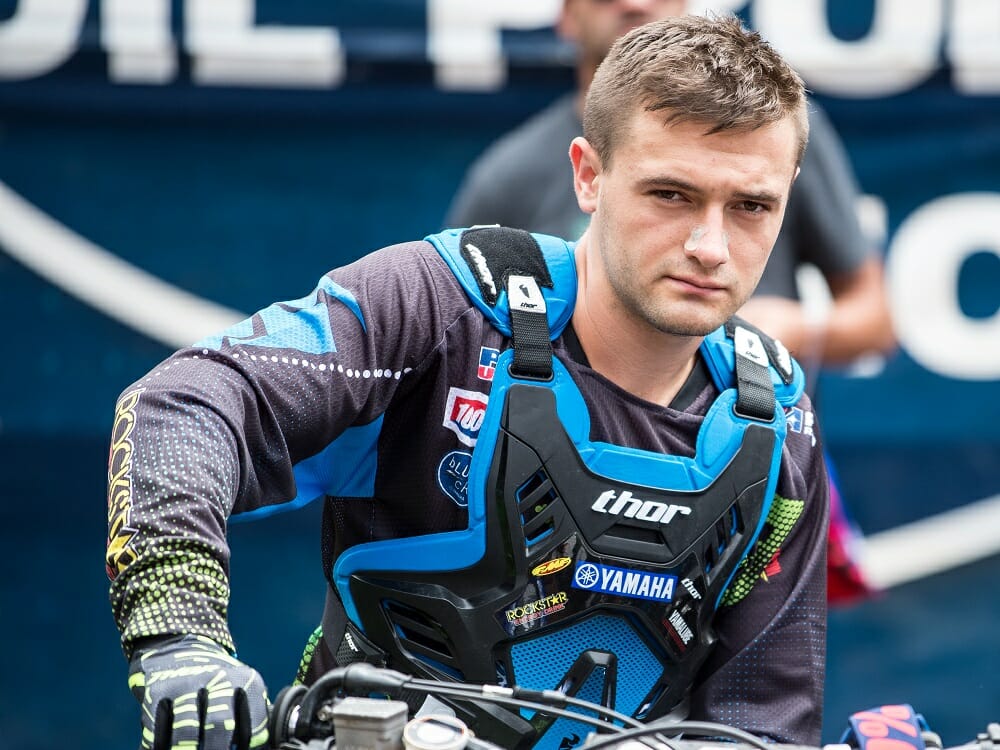 Cooper Webb said goodbye to the 250cc class with two titles in 2016. Photography by Kit Palmer
Cooper Webb said goodbye to the 250cc class with two titles in 2016. Photography by Kit Palmer
And in 2016, he overcame some serious adversity to take down two 250cc titles in his last season in the class.
Now a two-time AMA 250SX Supercross Champion and 250cc National Motocross Champion, Cooper Webb is setting his sights on the 450 class for 2017, and the established stars had better be paying attention, because Webb isn’t doing it for fun.
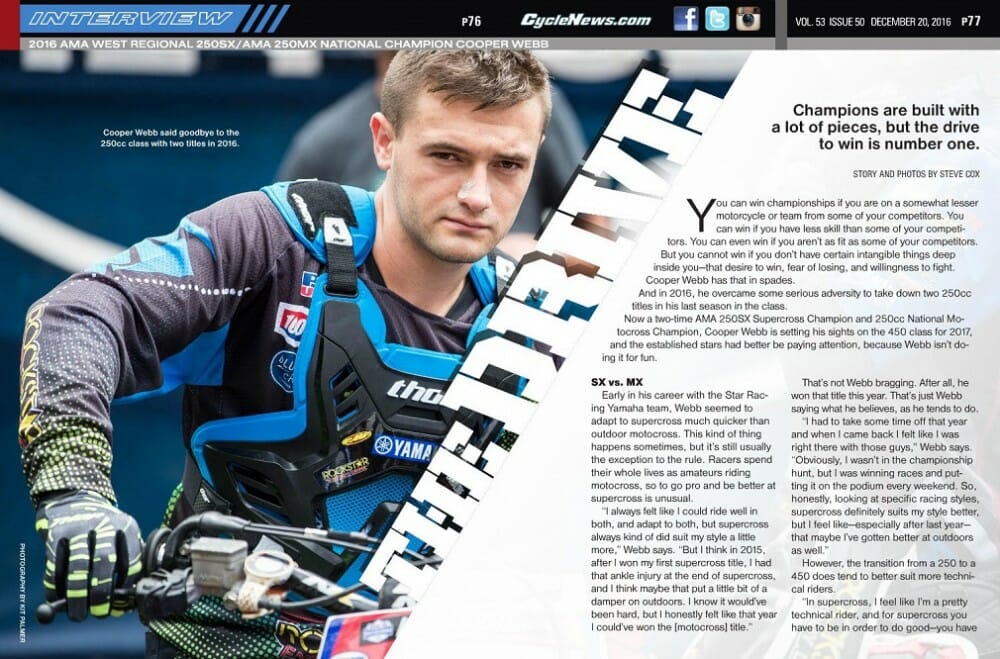
To read this in Cycle News Digital Edition Magazine, click HERE
Photography by Steve Cox
SX vs. MX
Early in his career with the Star Racing Yamaha team, Webb seemed to adapt to Supercross much quicker than outdoor motocross. This kind of thing happens sometimes, but it’s still usually the exception to the rule. Racers spend their whole lives as amateurs riding motocross, so to go pro and be better at Supercross is unusual.
“I always felt like I could ride well in both, and adapt to both, but Supercross always kind of did suit my style a little more,” Webb says. “But I think in 2015, after I won my first Supercross title, I had that ankle injury at the end of supercross, and I think maybe that put a little bit of a damper on outdoors. I know it would’ve been hard, but I honestly felt like that year I could’ve won the [motocross] title.”
That’s not Webb bragging. After all, he won that title this year. That’s just Webb saying what he believes, as he tends to do.
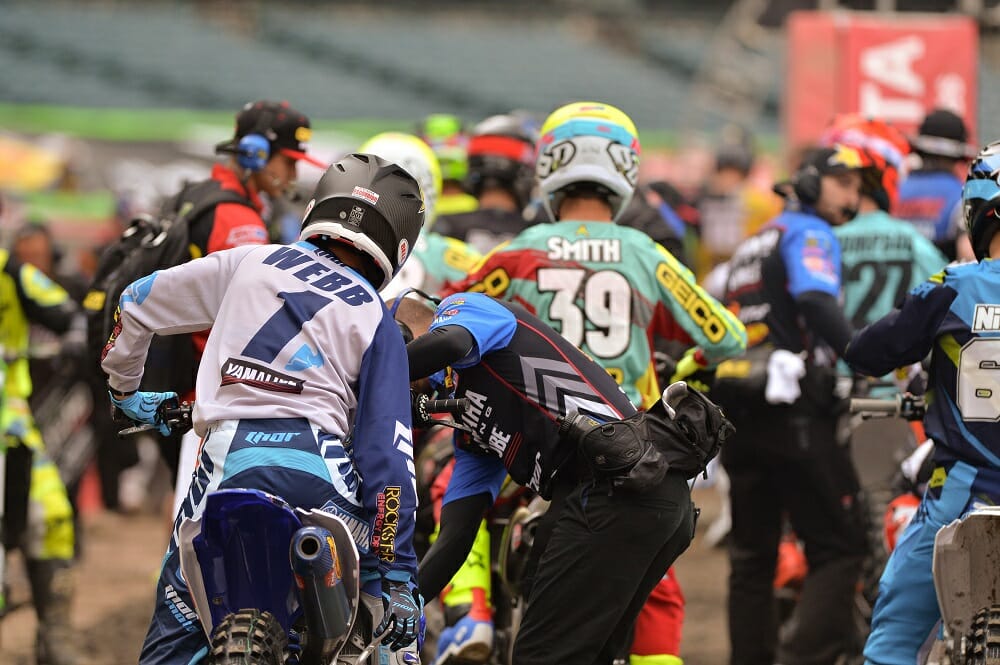 Webb says that his riding style probably suits Supercross more than it does motocross.
Webb says that his riding style probably suits Supercross more than it does motocross.
“I had to take some time off that year and when I came back I felt like I was right there with those guys,” Webb says. “Obviously, I wasn’t in the Championship hunt, but I was winning races and putting it on the podium every weekend. So, honestly, looking at specific racing styles, Supercross definitely suits my style better, but I feel like—especially after last year—that maybe I’ve gotten better at outdoors as well.”
However, the transition from a 250 to a 450 does tend to better suit more technical riders.
“In Supercross, I feel like I’m a pretty technical rider, and for Supercross you have to be in order to do good—you have to be smooth and you have to hit your marks—where for outdoors, if you’re too precise, you’re not going fast enough [laughs]! It’s that simple. You’ve got to be used to making mistakes. You’ve got to be used to blowing out corners. And the bumps? You have just hit them as fast as you can sometimes.
“That’s not honestly my style, but I still have to do it. I think some outdoor tracks, you ride with some technique, because I feel like I’m really good at jumping bumps and flowing, and at certain tracks you have to do that because the bumps are so big and gnarly. But some of the west-coast tracks without such deep bumps, you can just kind of get away with just bulldogging and hitting them as fast as you can. And that’s just with the 250 class, because the bikes aren’t as powerful, and you’re always trying to carry your momentum. You don’t really have an option really to try to make everything perfect.”
But with an outdoor title in the bag, it’s safe to say that he’s proficient now in both disciplines.
Tenacity
If there’s one thing that stands out about Cooper Webb, it’s his tenacity. He’s a bulldog. He’s stubborn, he takes everything personally, and he uses it against his competition. If he believes someone did him dirty, you can believe he’s going to make that person pay for it, often within a few corners, or at worst within a few races. Webb is old-school moto. In the ’80s, for example, most guys on the track were like Webb; they’d run into you, knock you down, or even on occasion, they’d end up in fights back in the pits.
Webb hasn’t gone that far, but that doesn’t mean he hasn’t wanted to fight anybody. For examples, watch the Washougal National this year. After championship rival Joey Savatgy ran Webb wide on lap one, Webb made him pay for it only a few turns later. Webb went down, too, but the message was sent, and the incident ended up favoring Webb overall in the championship. There are plenty more examples like this. Eventually, racers are going to have to figure out that if you race Webb rough, he’ll pay you back many times over.
“I’m definitely aggressive,” Webb says. “I don’t feel like I do anything dangerous or frowned upon. I mean, I hate cross-jumping and dangerous stuff like that. I don’t do it. And sure, I’ve been in incidents where I’ve taken somebody out, but it’s not like I’m out there trying to take somebody out. Usually if I stuff somebody or run into somebody, it’s usually some sort of retaliation from somebody else doing that to me. Usually. But, at the same time, there are situations—especially in Supercross, where if you get a bad start, you just don’t have enough time to be too patient—where you have to make those aggressive passes.
“In the Lites class, we are all young and trying to make a name for ourselves, so I feel like with as much time and effort and sacrifice that I’ve made to be successful in this sport as a racer, every time I’m out there I want to win. Some people don’t have that. I think a lot of people say they want to win, but they don’t necessarily go above and beyond to make sure that it’s going to happen.
“It might be something you’re born with; that edge, and that hate of losing. Once you get the taste of winning, that’s all you ever want again. It’s tough because you’re taught all your life as a kid to be appreciative, and if you lose, to not be a sore loser, and I feel like I’m not a sore loser. I feel like I’m respectful and all that. But on the inside, I mean, it’s nothing personal against the person, but if I rode my ass off and I still lost, I’m not necessarily happy.”
And that’s one of the universal truths of competitive people: If they look happy and friendly after losing, they’re acting. They’re being dishonest. So, sure you can be angry at Cam Newton for being upset after losing the Super Bowl, but there’s no such thing as a player who loses the Super Bowl and doesn’t feel exactly like Newton did. The only difference is how they act.
“As a competitive person, anything you do, you want to win,” Webb says. “I try to make sure the only thing I take to that extent is racing, because that’s what I do, and what I get paid for, and what my life consists of. Obviously, I want to be good at anything I choose to do, but when it comes to the sacrifice I’ve made for this sport, this desire to not lose is part of it. But whenever any athlete or competitor gets beat, they aren’t pumped about it. They’ve just got to put on their good face. Some guys are better at that than others.”
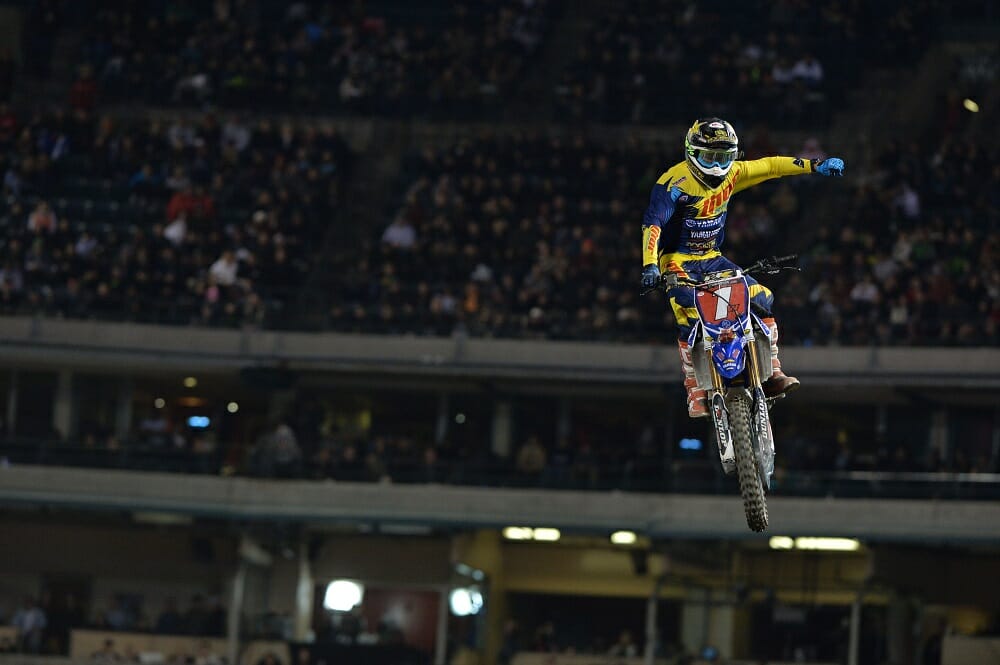 Webb fought hard for the 250SX West title, winning it by one point and with a broken wrist.
Webb fought hard for the 250SX West title, winning it by one point and with a broken wrist.
The Wrist
Before the final AMA Supercross event of the 2016 season, in Las Vegas, Cooper Webb was leading the 250SX Western Regional Supercross points standings, but he had a crash coming in to the finale that led to a fractured wrist. His team, his agent, and many others around Webb thought it would be heroic of him just to pull off the SX title, and none of them thought he’d be able to race the motocross nationals—at least not the whole championship.
Going into Vegas, Webb needed to finish 12th or better to win the title if rival Savatgy won. Webb fought through it for 11th, and Savatgy did win, giving Webb the title by a single point. And that’s all anybody expected of Webb. But two weeks later, he lined up at Hangtown and went 4-5 for third overall. Then, at Glen Helen, he actually won the first moto. None were more surprised at that point than Webb.
“Nothing really happened with my wrist that made it better,” Webb said. “I wanted to win outdoors. That’s all that happened. It was my last chance. The last year [2015] I sat on the sidelines and watched Jeremy [Martin] win, and it was bittersweet at the end of the year in Indiana to win but lose the title, so I told myself that I really want to win the outdoor title the next year, and that I was going to work my ass off to make sure that happens.
We had a bike problem that ended up [breaking] my wrist, so in my mind, I wanted to wrap up Supercross even if my wrist was going to fall off. I was going to race and try to win the title even if I was one-handed. Then outdoors, I still kind of had the same mentality that I was going to do it no matter what, unless the doctor really said I could do permanent damage. But like I said, I think that’s something that comes from within, and it was something I hadn’t been able to do, and I really wanted to win.
“I didn’t ride at all leading up to outdoors, and I was just training and doing rehab and therapy that I could do to try to heal it as quickly as possible. It was still broken at the first three rounds, really, but it actually worked out well for the break to come after those races, because I got a weekend off.”
After the break, round four was at High Point Raceway, which Webb survived going 3-5, but then came Tennessee, and Webb has always liked Muddy Creek Raceway. He went out and won with a 2-1 on the day, moved into second in points, and that was pretty much it. From there, Webb was a juggernaut. It seemed as if the win at Muddy Creek gave him the confidence he needed for the rest of the series, but Webb says he got that confidence while he was still hurt during the first three races.
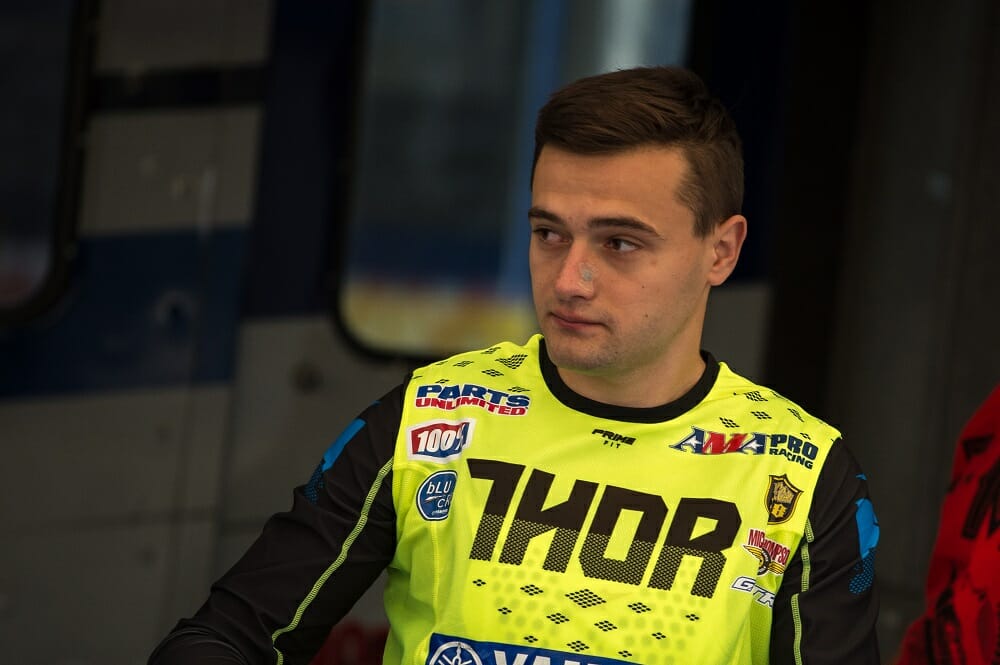 After winning the 250SX West Championship, Webb carried a broken wrist into the outdoor nationals. Photography by Kit Palmer
After winning the 250SX West Championship, Webb carried a broken wrist into the outdoor nationals. Photography by Kit Palmer
“I think there were a lot of elements,” Webb says. “First, my wrist was finally starting to heal, and then moving back east was huge. Also, I was able to ride during the week at that point and start doing some testing, so it was a mixture of everything. Honestly, I had the confidence since the first race, though. I knew at the percentage that I was riding in the first three races. I mean, I won a moto at Glen Helen, and I felt like I was nowhere near where I needed to be, so…I knew it was going to happen, but I just had to accept that I wasn’t at 100 percent, and whatever happens, happens.
“The plan from the beginning was to get through the first three and just score points and go from there. It just so happened that I did awesome at those first three, and I think I was only down by 13 points after Colorado, so in a dream world, that’s what we were hoping for, but it didn’t seem realistic before round one. I rode one day before Hangtown and hadn’t done any testing or anything, and I just didn’t know. I knew deep down that I could probably be around the top 10, and that was kind of the goal; to go out there and score points and not be more than 50 points down at the break. But I was only 13 points down.”
In the final 15 motos of the 2016 AMA National, Webb ended up winning seven, and finishing off the podium only three times, including once after he fell paying Savatgy back at Washougal. He was so dominant that he ended the series 73 points up on runner-up Alex Martin in the title chase.
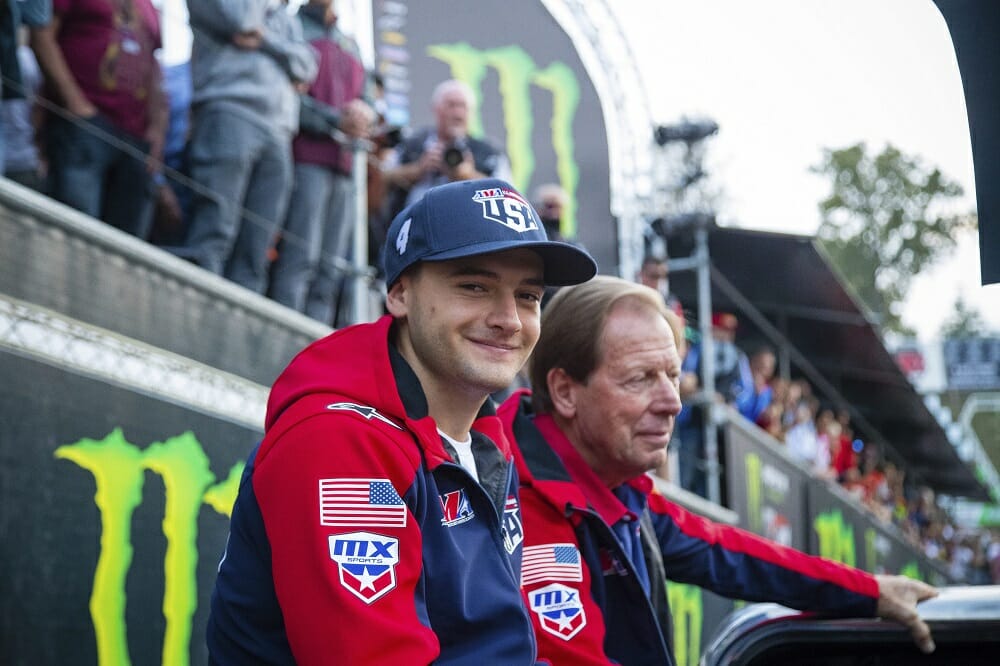 The Motocross of Nations might’ve been a bitter disappointment for Webb, but he says he’ll use the experience as a motivator. Photography by Hoppenworld.com
The Motocross of Nations might’ve been a bitter disappointment for Webb, but he says he’ll use the experience as a motivator. Photography by Hoppenworld.com
The Nations
With his dominance outdoors, Webb was picked to race a 450 at the Motocross of Nations for Team USA for the second time in a row. This time, though, instead of being the rookie and racing the Open class, he’d be racing the premier MX1 class, bringing a couple MXoN rookies with him, namely teammate Alex Martin (MX2) and Husqvarna’s Jason Anderson (Open).
After a lot of rough luck with gate choices and the like on Saturday, Team USA got off to a great start on Sunday, including a moto-two win by Anderson that put Team USA solidly into the lead going into the final moto. However, as he crossed the finish line, Anderson rolled the jump, put his fist in the air, and then was landed on by a lapped rider, putting him into the hospital before his final moto of the day. And Webb knew nothing about it until he was on the starting line.
“That was probably the most pressure I’ve ever had on me, for sure,” Webb said. “It was just an unfortunate set of circumstances with how it all went down, because everything was looking so good. We did great the first moto and were right there, and in the second moto, we absolutely killed it, especially with Jason [Anderson winning the moto]. It was just the circumstances. What are the chances of someone landing on the winner of the race like that? If you really break it down, what would the chances be? Has that ever happened before? I don’t know. It was bizarre. And the thing was, nobody told me.
I was getting dressed and getting warmed up, and I just kept asking, ‘Hey, is Anderson out front? Is he still winning?’ I think there’s only like a half-hour between motos. So they told me, ‘Yeah, he won the race.’ I start getting dressed, I warmed up, and I was about to start walking over to his tent to ask him about lines and stuff like that, and that’s when they told me he got landed on, but that he was all right.
“I thought it was no big deal because I think our math said we both had to finish inside the top 12 to clinch the win, and after seeing what he just did, I was confident that we could both get in the top 12 even with maybe a few mistakes. It felt almost like a pressure-free kind of situation. Sure, it’s the Nations and there’s always pressure, but you hope for a scenario where the last moto is kind of an easy one.”
Webb was set up for an emotional rollercoaster ride in that final moto.
“I went up to the gate, and waited and waited, and Anderson finally didn’t show up,” Webb said. “But even then, there wasn’t a lot of pressure at first, because I figured there’s no way we could still win, so I could just go out and race for pride and not really have to worry about messing anything up. But then they did the math and said that if the final moto would be our throwaway moto, we still had a chance to win it, and they listed off all the guys I had to beat. That’s when it hit. It was a lot of pressure. The odds weren’t good, but I knew I had to go out there and do it. There was no backing down at that point. I’m already on the gate, prepping it, and now I know the pressure, and it’s all on me.”
It was time to go to work.
“The unfortunate part was that I asked the guys not to tell me anything on the pit board unless I have to pass somebody,” Webb said. “I don’t care about the points, it was just, ‘Hey, if I have to pass this person to win, then let me know.’ I knew I had to beat [Romain] Febvre and [Gautier] Paulin—both of France’s guys—and I got around [Glenn] Coldenhoff, and that put us in the lead, and then I knew Febvre was behind me, so the last couple laps, our pace was so good that we caught Tommy Searle, but the thing is, at that point, where we were sitting, Febvre could’ve actually passed me and we would’ve tied for the win, but the tiebreaker would’ve gone to us for some reason.
“I don’t remember the details, but that’s what our guys said. But they didn’t tell me that, because I told them not to, so I thought that if Febvre passed me, France would win, so I was telling myself, ‘All right, if I can get around Tommy, we have two laps to go, and it’ll take a little bit for Febvre to get around him, so I can try to get a gap.”
Webb fell trying to set Searle up for the pass, and that was that.
“Going up to where I crashed, I knew the line Tommy was taking in the next corner, and I knew I had to be close but that I could pass him in that next corner,” Webb said. “I think I was already thinking about that next corner, and my back end just slid out of that rut. It was literally an inch. I went back and looked at the mark and everything. That corner was tough to begin with, but it was definitely a bummer.
“It sucked at the time, but I think it’s something I learned from. I use it as a motivator. I mean, that much pressure has to teach you something, and I didn’t just crack. I could’ve just cracked and gone to shit right away. And that’s what made it almost a little bit harder, which was like, ‘Holy cow, he’s pulling this off!’ It was almost a Cinderella story, but it is what it is.”
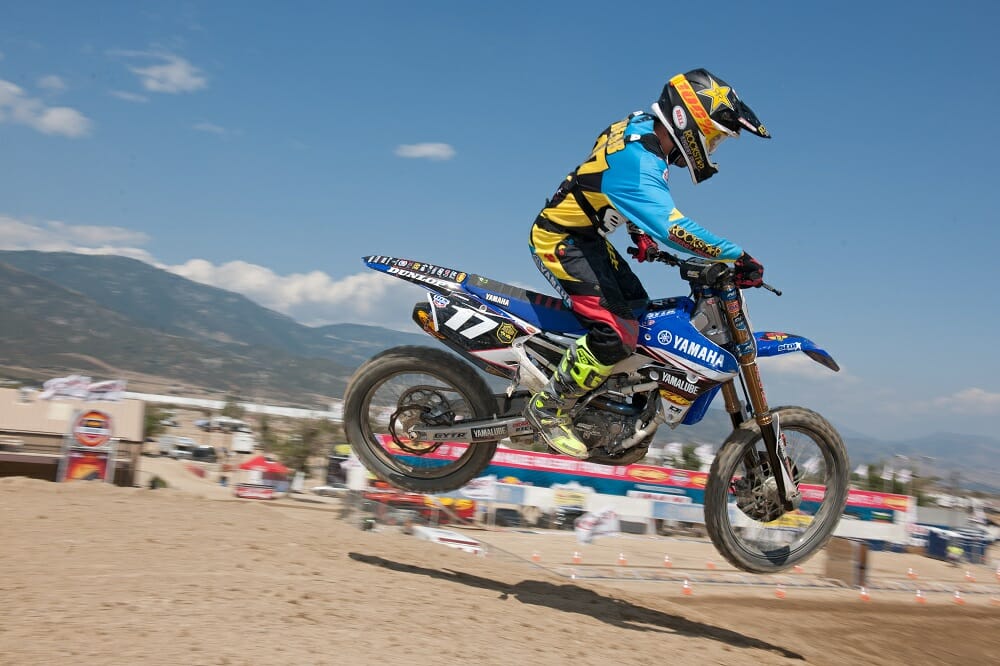 As Webb’s wrist improved, so did his results in the outdoors.
As Webb’s wrist improved, so did his results in the outdoors.
Still Not Scared
Overcoming his wrist injury to win both 250cc titles in 2016, then heading to Europe and nearly pulling off the MXoN win essentially by himself in the final moto, it’s clear that Webb isn’t a timid man. Having won his first national championship, Webb was allowed per AMA rules to pick a permanent single-digit number, or any other number he wanted, as long as it wasn’t already taken. So, he picked the lowest number he could—2.
“At the end of the day, the reason I chose number two is because of how dominant it is,” Webb said. “I actually really liked the number 17 but I knew you don’t get a lot of chances to get a single-digit number like that, so I knew I should take one. What’s funny is that 9 was my first number I raced with, and I used it for about three years. So, at first, 9 was the one that really interested me, and it’s funny because I’m buddies with [Ivan] Tedesco [the last guy to run 9 in AMA Supercross and Motocross], and we’re pretty similar in that he won two Lites SX titles and an outdoor title, and I was in that same scenario.
“And 8 was cool with the whole [Damon] Bradshaw thing, and factory Yamaha and all that, and that would’ve been good, too. But ultimately I made the decision just because of how dominant that number’s been. The only thing I didn’t like was that Ryan [Villopoto] had just had the number, but at the same time, most people are probably always going to associate 2 with [Jeremy] McGrath, regardless. So, once I kind of realized that it’s really tough to make a number like that only yours—because 2 through 9 have all been somebody—then I chose 2.”
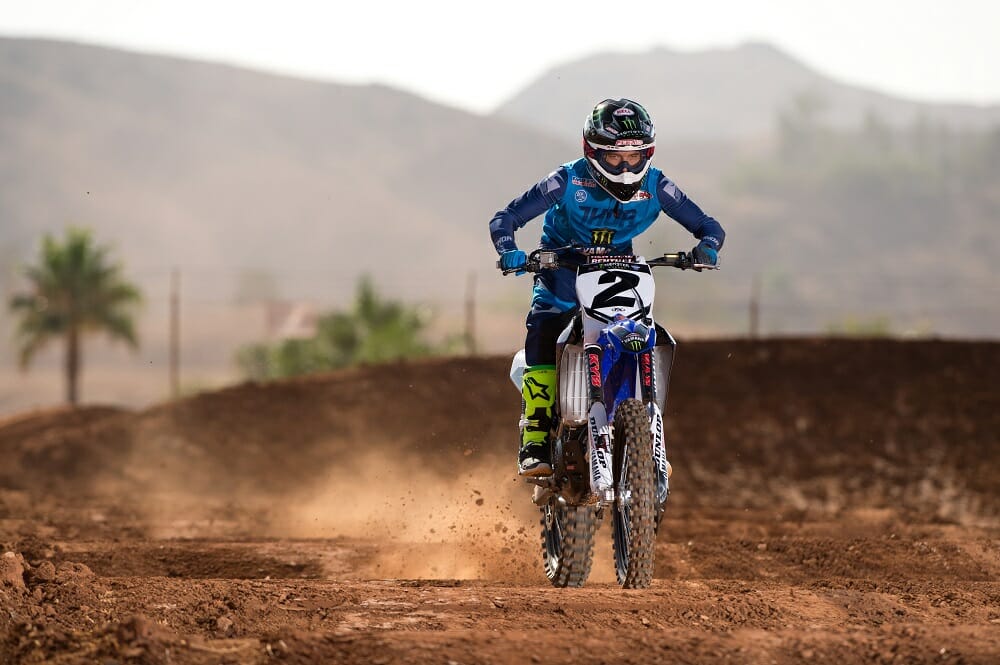 Following the footsteps of Jeremy McGrath and Ryan Villopoto, Cooper Webb will wear the number 2 for the rest of his racing career.
Following the footsteps of Jeremy McGrath and Ryan Villopoto, Cooper Webb will wear the number 2 for the rest of his racing career.
New Competition, New Challenge
Now, having won what’s available in the 250cc class, Webb has signed on to race for the Yamaha factory team alongside veteran Chad Reed. Thirteen years ago, when Webb was seven, Reed began his tenure in the premier class as a rookie with Yamaha. Now, it’s Webb joining Reed on the team to do the same.
“The 450cc testing is going good,” Webb says of the switch to the new bike. “It’s so much different from the 250 stuff, dealing with factory Yamaha. It’s going really good, but it’s just a lot different. I’m used to testing five things, and that’s all there is to test, but now every part of the motorcycle has an option.
So, it’s kind of figuring out what’s good, what’s bad, and that whole process, and at the same time I’m working on getting [physically] stronger and trying to put in motos and all that stuff. It’s a big transition, and I expected that, but the bike is really good. I was happy with it the first time I sat on it. Yamaha has been putting in a lot of work to make sure it’s going to be an awesome bike, and I think it feels very similar to my 250, so that’s a good sign, I think.
I’m still learning every day how to be better on the 450 and all that. The off-season stuff is going good. I’m doing a lot of training right now to get stronger and all that, so I’m doing my part.”
Often when asking a rookie for a prediction about how they believe they’ll do in the 450cc class, they try to be humble. They know it’s a big step, but they try to be careful in what they say or how they say it. Sometimes, it comes across like they’re just hoping not to anger any of the established racers. Webb was straightforward, though.
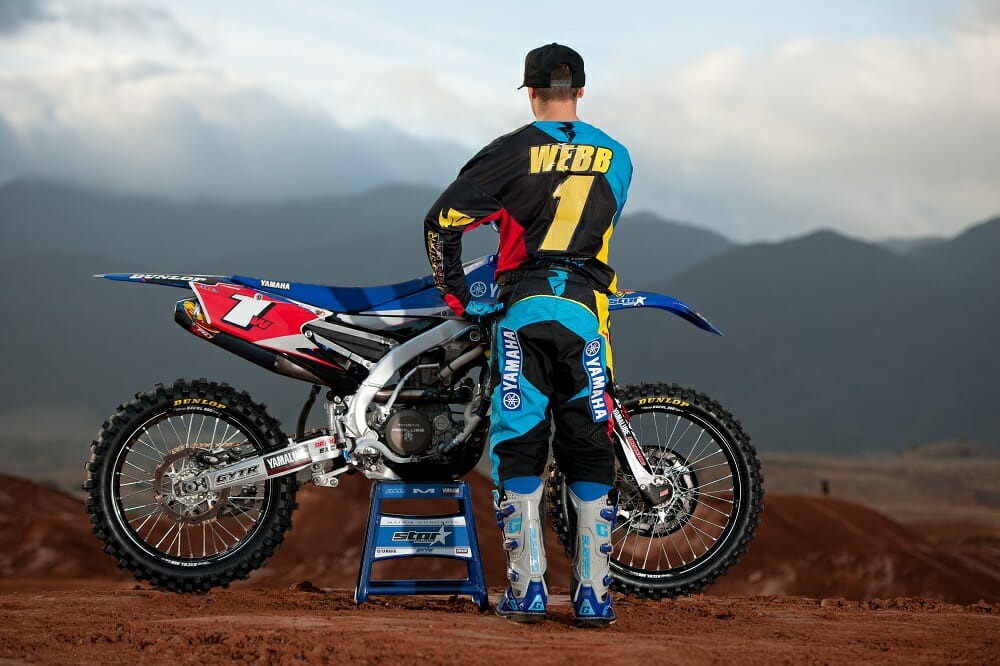 Webb won’t get the chance to wear any of his number-one plates in 2017.
Webb won’t get the chance to wear any of his number-one plates in 2017.
“It’s tough to say how well I’ll do,” Webb said. “As a racer, I want to come in and say, ‘Hey, the goal’s to win the championship.’ And I think at the end of the day that is the ultimate goal. But I think for me at this point in my career, and being a rookie and all that, I honestly don’t know at this point. I think I just need to go to Anaheim and take it lap by lap, practice by practice and race by race.
I know what I can do on a dirt bike and I feel like I have all of the puzzle pieces to be a champion and win in the 450cc class, but if that doesn’t happen in my rookie year, then that’s fine. I’ll just do the best I can regardless and try to learn as quickly as possible. If it does happen, then that’s fantastic. The thing is, I want to win. I’m going in there to win. That’s still the goal. That’s what I train for. But if I don’t, I’ll be bummed, but as long as I can learn from it and use it as a motivator, that’s acceptable, too.
“It’s a little different in the 450cc class because I always felt like I’ve been in a situation where I’m one of the top dogs in the class, and I personally think I still am, but now there are eight or 10 top dogs, not just two or three. I think that’s the biggest thing. For me, I feel like I have the speed and I have everything else, but it’s just a matter of seeing what happens over the course of 18 races and all that. I’ll just have to be on my A-game every weekend and see what I can do!” CN
For more SX/MX news, click HERE